A Mostly Serious Meditation on Patriotism
Honestly, probably my favorite article to date. Accurate and coherent? Perhaps not, but I sure had fun writing it.
My first lessons in patriotism despite the odds came in Albania, of all places.
For two years beginning shortly after my 19th birthday, I served a mission for the Church of Jesus Christ of Latter-Day Saints, or Mormon Church, in Albania. Missions and missionaries are fun to stereotype and paint with the same broad brush, but a mission in Albania is not a mission in Argentina is not a mission in Australia is not a mission in Alabama, and missionaries, as similar as their core beliefs might be (although there is variance there too), are individuals—young, but human, and fully so. What I say about my mission may not be true of someone else’s, and I don’t mean to imply that it is.
Albania offers a surprising range of geographic treasures for a country about the size of Maryland. With the 2021 addition of asphalt to the road from the northern city of Shkodër to the mountain village of Theth, an enterprising tourist in a rented car could in the span of a tiring day travel from the cool, alpine valleys of the Albanian Alps, through the lowland plains extending east from the Adriatic, up into the Ceraunian Mountains south of Vlorë (in Albanian, Malet e Vetetimës, or “Thunderbolt Mountains”), and, finally, down a too-narrow switchback highway to the extended white pebble beaches that line Albania’s share of the Ionian Sea.
Theth
Albania’s capital city, Tiranë, my home for nine months.
A nigh-21-year-old me in December 2010, some 3,000 vertical feet up into the clouds above what would in summer be a clear and inviting Ionian Sea. The jeans were made in Turkey, I believe, and evidently not for someone of my exact proportions. May my hairs rest in peace.
Eight months later, back as a tourist with my family. These were taken in Durrës, around two miles from the downtown and Adriatic boardwalk. I lived on the second floor of the pink home for six months. That was my favorite shirt for years, a fact my wife finds amusing for some reason (my fashion sense has not improved).
Ksamil, approximately 15 miles north of the Greek border and a 1.5 mile swim from Corfu, the Greek island and birthplace of Prince Philip, husband to Queen Elizabeth II and father of King Charles III.
Albania is bordered by Greece to the south, North Macedonia to the east, Kosovo to the northeast, and Montenegro to the northwest. Each neighboring country contains large populations of ethnic Albanians or, in Greece’s case, once did, with Albanians comprising approximately 5% of Montenegrins, 25% of North Macedonians, and nearly 92% of Kosovars.
Albania’s path to a stable democracy has been and remains rocky. It was part of the Ottoman Empire from the late 15th century until it declared independence on November 28, 1912; spent the next 27 years as a fledgling republic, then a fledgling monarchy; was invaded by Fascist Italy in 1939, then passed to the control of Nazi Germany in 1943; and was again liberated on November 29, 1944, not by the Allies, but the Democratic Front of Albania (Fronti Demokratik i Shqipërisë) and its leader, Enver Hoxha (pronounced ho-ja).
The upside of Hoxha was liberation from the Nazis; the downside was brutal, hypernationalistic Communism. Hoxha ruled an increasingly isolationist and paranoid Albania—under his leadership, Albania constructed over 170,000 bunkers intended to frustrate external invasion—until his death in 1985.
Bunkers still dot the countryside. Comfy.
To be fair to Hoxha, the United States and United Kingdom actually did try to topple his government at various points from 1949 to 1956. Operation Valuable failed miserably: every time British, American, or NATO agents and anti-Communist Albanians trained abroad attempted to infiltrate the country, they were met almost immediately by Hoxha’s security forces; it was as if they knew they were coming. As it turned out, they did: MI6’s Washington liaison and a key figure in the operation’s planning was Kim Philby, perhaps the most successful member of the Cambridge Five, a group of five British double agents who passed classified information to the Soviets during World War II and the early stages of the Cold War. Over the course of Operation Valuable, over 1,200 Western Bloc agents were killed or captured and 400 Albanian citizens were executed; the Albanian Communists didn’t suffer a single casualty.
The Communist government crumbled in the early 1990s in parallel with the collapse of the Soviet Union, Albania’s one-time ally. Albania had initially enjoyed warm diplomatic relations with the U.S.S.R., but withdrew from the Warsaw Pact following the 1968 invasion of Czechoslovakia, and later sided with the Chinese as the Chinese and Soviets parted ways. That relationship soured too: as of 2010, the only sign apparent to me that Albania had ever been close with China was a small community of Chinese expatriates in Tiranë, all of whom seemed to be engaged in running remarkably good Chinese restaurants.
The fall of Communism brought rapid privatization. The period of 1992 to 1996 saw market liberalization and economic growth, but, with the government’s ill-advised encouragement, as many as one in every six Albanians—and virtually every family—invested heavily in a series of Ponzi schemes. The $1.2 billion invested—$2.45 billion today—was equal to half of Albania’s gross domestic product. To give you a sense of scale, the 2023 GDP of Barrow County, Georgia, population 83,500, was just under $2.36 billion.
In late 1996, the schemes collapsed, leading to a six-month period of serious civil unrest; over 2,000 Albanians lost their lives, the prime minister and president resigned, and the United Nations sent a 7,000-strong peacekeeping force to restore order.
Today, Albania is stronger and more stable, but still no beacon of liberal democracy. Over the past 20 years, Albania has had just two prime ministers: Sali Berisha, of the center-right Democratic Party, and Edi Rama, of the center-left Socialist Party. Both men have been credibly accused of serious corruption. Elections are routinely contested for years, with frequent—and justified—accusations of fraud. I was living in the southern city of Vlorë during the parliamentary elections held in June 2009—Berisha was running for reelection against Rama, at that point nine years into a popular 11-year run as mayor of Tiranë. Berisha’s Democratic Party received fewer votes than the Socialists (who aren’t really socialists, as we would use the term), but retained a majority in Parliament—and Berisha his position as prime minister—after forming a governing coalition with a smaller party. Controversy surrounding the election endured for years. I recall contemporary rumors of a minor candidate who allegedly received zero votes, despite voting for himself; another minor candidate who received seven votes when he had 12 family members of voting age; and numerous boxes of ballots which, when tabulated, provided a unanimous 400 votes to one major candidate and zero to the other. Albania has not yet been inducted into the European Union despite having that as goal since before I got there.
Yet despite that ignominious past and present, Albanians by and large were stoked about being Albanian. Many of them wanted to leave home for the fairer economic climes of Italy, Greece, or, for the luckiest, the United States—they were open-eyed about Albania’s limitations—but that didn’t stop them from feeling a pride in their country and in themselves that sometimes made little sense to foreign missionaries—American, English, and French—who, when asked about their own sense of patriotism, would cite indisputable historical triumphs, services done to the world, or present power and influence.
American mythmakers have nothing on the Albanians—almost anything could be reason enough for Albanian exceptionalism. The Albanian national hero, Gjergj Kastriot Skënderbeu—romanized as Skanderbeg—is so lauded not for ultimate defeat of the Ottoman Empire, but for holding them off until his death in 1468. Albanians were proud of the difficulty of their 36-letter, entirely phonetic alphabet, constantly comparing it to the easier, 26-letter English alphabet—ignoring that English’s 26 letters make 42 sounds. An elderly gentleman once told my companion and me—at some length—that the English word “tomorrow” came not from Old English (“to morgenne”) through Middle English (“to morewe” or “tomorn”), which it did, but from the name of the southcentral Albanian Mount Tomorr (Mali i Tomorrit): the sun comes up over Tomorr, ergo the English adopted it for their word for, well, tomorrow.
Albanians lived—and I hope still live—in an Albano-centric world, in a world where every noble historical figure of definite or debated Albanian connection, from Constantine the Great, the son of an Illyrian, reputedly the ancient ancestors of the modern Albanians; to Muhammad Ali (Mehmet Ali Pasha), the ethnic Albanian Ottoman viceroy and founder of modern Egypt; to Mustafa Kemal Atatürk, the Turkish field marshal and first president of the Republic of Turkey, was great because he was Albanian, and Albanians were great because of him, and the ignoble figures—like the half-Albanian Ottoman Enver Pasha, who, as one of the principal architects of the Armenian, Greek, and Assyrian genocides of the early 20th century, was held legally responsible for up to a staggering 2.75 million deaths, more than the entire current population of Albania—are forgotten. Albanians are more like sports fans, in it even if their team goes on a 500 year losing streak, than religious adherents, devoted but vulnerable to challenges to their beliefs.
Albanian patriotism is beautiful, and maybe irrational, and it taught me something about my own.
*************
In January 2001, Gallup began asking Americans a simple question: “How proud are you to be an American?”
As of that initial survey, 87% of respondents felt “extremely” or “very” proud: Republicans were at 90%, Democrats 87%, and independents 84%. But over the last ten years, the bottom has fallen out for Democrats, independents, and all of Generation Z. Only 65% of Gen Z Republicans, 53% of all independents, and 36% of all Democrats are now extremely or very proud to be American.
It doesn’t take a genius to guess why so many, especially on the left, now feel so much less patriotic. For some, it’s a question of the man in the White House: as much as some love President Trump, this era of American politics has been completely, irrevocably discombobulating for others. For some, it’s a question of values, of what the country is currently doing: they recoil at celebrating the Fourth of July immediately after the passage of a controversial bill that may remove insurance coverage from thousands, during the most significant anti-immigration push in decades, and as the U.S. continues its—depending on your perspective—overinvolvement in the Middle East and underinvolvement in Ukraine. For some, it’s a question of current and historical wrongs—of slavery, Jim Crow, and their considerable aftershocks; of the colonization of North America and the mistreatment of Native Americans; and of disastrous American interventions in foreign lands, both those we often speak about and those we don’t. And for some—I think younger Republicans might fit here—it’s about the decreasing accessibility—be it real or perceived—of the American Dream, of a stable job, the picket fence, a loving family, and annual trips to Disneyland.
As Michael Baharaeen wrote in The Liberal Patriot:
“Trump presents a very different view of what it means for America to be great than the one shared by most Democrats. Summed up in his campaign mantra, “Make America Great Again,” Trump—and many of his voters—believe the country is in decline and that its best days are behind us. This is the rationale behind his “America First” agenda that includes, among other things, sweeping tariffs and more immigration restrictions, policies designed (at least in part) to help return America to a time when it was the dominant economic force globally and good jobs were abundant.
By contrast, liberals often believe that those past periods in American life were imperfect, as not everyone who lived here was able to fully participate in it. They consider the trajectory of American society toward one that is more diverse, tolerant of difference, and open to the world than it was in the past as a positive sign of progress. And they believe that Trump represents a bulwark against that kind of change. So, when a substantial share of voters decided to return him to office and support his new policies, many on the left took it as a sign that their country was rejecting their view of progress in favor of Trump’s appeals to nostalgia—and far more Democrats now share the view that America’s best days are behind it.”
Baharaeen goes on to emphasize the importance of a strong national identity, and offers practical suggestions for liberals looking to restore their faith in America, from “reflect[ing] on [its] extensive, positive cultural contributions[,]” considering its unparalleled track record of assimilating immigrants, and remembering our founding ideal—“the notion that anyone can make of themselves what they want in a society committed to pluralism”—to volunteering, cheering on our national sports teams, or attending a naturalization ceremony.
I appreciate Baharaeen’s suggestions, and fully agree regarding the importance of a strong national identity: I would argue a unifying, communal sense of self is crucial to actively maintain here, in a land formed, led, and populated by people of disparate backgrounds and beliefs, of different skin colors and cultures, and who speak different languages and eat different foods.
But many of those whose patriotic fervor has so declined are fully aware of America’s successes, both past and present, and believe as strongly as America’s most dedicated proponents that patriotism is, ultimately, good. The same approach isn’t going to land with everyone.
And it is in that spirit that I’d like to add my own, perhaps original contribution to the patriotic bonfire.
*************
There are logical, reasoned arguments to be made both for and against America. Sometimes, that’s the problem: if you were to earnestly attempt to weigh the entirety of America’s positive contributions against its sins, individually stacking inventions and liberations on one side of the scale and persecutions and subjugations on the other, looking to the eventual tip one way or the other to determine whether patriotism is justified, you’d, first, drive yourself crazy, and second, place your patriotism or lack thereof in a precarious position, subject always to the addition of new goods or evils or fresh discoveries of the old. I am not aware of any value-based, accomplishment-based, or other rational argument either for or against America that cannot be countered, if not correctly, then reasonably, intelligently, and in abiding good faith.
A robust, contagious, persuasive patriotism cannot solely be based on the good we have done or the good we are.
A robust, contagious, persuasive patriotism cannot solely be rational.
So here’s my grand contribution to a centuries-old discourse: treat America more like your sports team, not your religion. No, seriously.
Religion, to outsiders and some self-aware insiders, seems irrational. In a sense, that’s true: religions tend to be built on and around founding myths that cannot be proven using available scientific tools, often seem completely impossible, and involve characters whose historicity is subject to scholarly debate: Adam and Eve in the Garden of Eden, Noah and his ark, Moses parting the Red Sea, Christ’s Virgin Birth and Resurrection.
But participation in religion is often rational. If people lose faith in their religion’s tenets or version of historical events—and are not kept there by some other factor—they tend to leave their congregation, sometimes for another religion and more often for no religion at all; faith, that belief in that which you can’t see, once lost, is difficult to restore.
The path away from—or further into—faith very often begins with learning a version of history you didn’t hear in a church, or synagogue, or mosque. Those moments when your worldview is questioned are crossroads: some, having opened up to the new, see the structure on which they’ve based their very sense of reality come crashing down, and are left, sometimes alone, to pick up the pieces; others, recognizing the threat, erect their defenses—they fight, and work to discredit what they can’t easily ignore; and still others embrace the new information, but more as an addition to what they had before than as a challenge, and are left with something more nuanced, more complicated, and potentially more durable. That long sentence oversimplifies a complicated dance, but there are readers who will see themselves in it.
And people do the exact same thing with America. For most of us, what we learned as children was, for good reason, not the full story. A 7-year-old will learn of the founding ideals and the American Dream, not lynchings; of how we saved and remade the world, not of actual and tacit support for the atrocities committed in the killing fields of Indonesia.
But those fuller truths eventually come out, and we are left to grapple with a changed reality. Some see their patriotism and love of country collapse, replaced by disillusion or an intense desire to effect change; others largely ignore the darker parts of our history, seeing legitimate complaints and criticisms as threats, and drowning them out with loud praise of the good; and others take a new, more complicated position, sometimes more patriotic about America’s future than its past.
And that’s why I think Americans should love America more like how Albanians, and citizens of so many other non-superpowers around the globe, love their own countries. More, to put it in a perhaps more familiar sense, like how we love our favorite sports teams.
I’m a devoted, more-or-less lifelong fan of the San Francisco Giants and University of Utah football. There are other teams I like just fine, but I only really feel for the Giants and the Utes.
I have been livid about the Giants’ or Utes’ performance probably 5,000 times—no one has ever interpreted that as an indication I didn’t love either team or as a threat to their own love. Sports fans rage about nothing more fervidly than their own team—the most brutal criticism athletes will ever face will come from the people who purport to like them. The Chicago Cubs didn’t win the World Series between 1908 and 2016—their fans still loved them (they beat the Giants in the 2016 playoffs, so I politely, respectfully kind of hate them).
There are past and present Giants and Utes I think are not very good people—that have committed moral crimes, broken the rules of their respective sports, or violated actual state or federal law. I condemn (and sometimes contextualize, with respect to the sports rules) what they did, but the crimes the teams would have to commit before I began cheering for the Dodgers or BYU defy human description.
I had a cousin drafted by the New York Yankees while I lived in New York and, while I was excited for him and have watched the vast majority of his minor and major league at bats over the last six years, I didn’t feel a thing for the Yankees (the same thing happened when his brother was drafted by the Twins—no offense, Minnesota). To all fans of the Yankees, Mets, NY Giants, Jets, Knicks, Nets, Rangers, Islanders, Liberty, and Red Bulls who wondered if, after over six years in New York, I might adopt a new team: nope, nope, nope, nope, nope, nope, nope, nope, nope, and nope. Don’t care about any of them.
And the Giants and Utes are not the best or most accomplished teams in their respective sports, either now or when looking at history as a whole. I don’t care. I love them.
I’m not even sure being a Giants or Utes fan was ever a choice—I just am. It is part of my identity, as inexorable as many other parts and more so than some.
And that’s the thing: America isn’t its government, or its past, or its present, or its land, or even its people—it’s you. None of us is just American (especially the one English subscriber), but it’s a pretty big part of what makes us, us. Patriotism, in that sense, is a love not of whatever you like or hate about what the Trump administration is doing, but of yourself. You don’t need to justify your love of country any more than you need to justify your love of self.
Perhaps only 36% of Democrats will openly claim to feel extremely or very proud to be American, but I kind of think the rest aren’t being honest with themselves: to protest, to scream into the ether about bills passed or policies pursued by the political opposition, to grapple with the guilt of past deeds done by past people, to grow disillusioned when the country goes in an unwelcome direction—what is this if not patriotism? Pride, be it bruised or damaged, is still pride.
America is not a religious dogma or congregation, at risk of evacuation when it seems its foundation cracks—although it certainly can be a dogma, and, all things considered, a pretty good one. It’s more fundamental than that, more stable and unchanging, and the love of it, both that which is rational and that which isn’t, more durable.
So, on this July Fourth, be a little more like an Albanian. Whether you want to wear thirty flags and blast off enough fireworks to set off earthquake detectors in New Zealand or post an 80,000 word essay on Facebook about how Trump is running this country into the ground and join a bunch of expatriate Albanians in Greece, remember to be proud to be American, and that, in all likelihood, you already are.
Random Fact
My sweet, perfect son was born on the Fourth of July. If, after reading this immensely persuasive article, you’re still struggling with your love of country, try having a kid on Independence Day. Believe me: it helps.





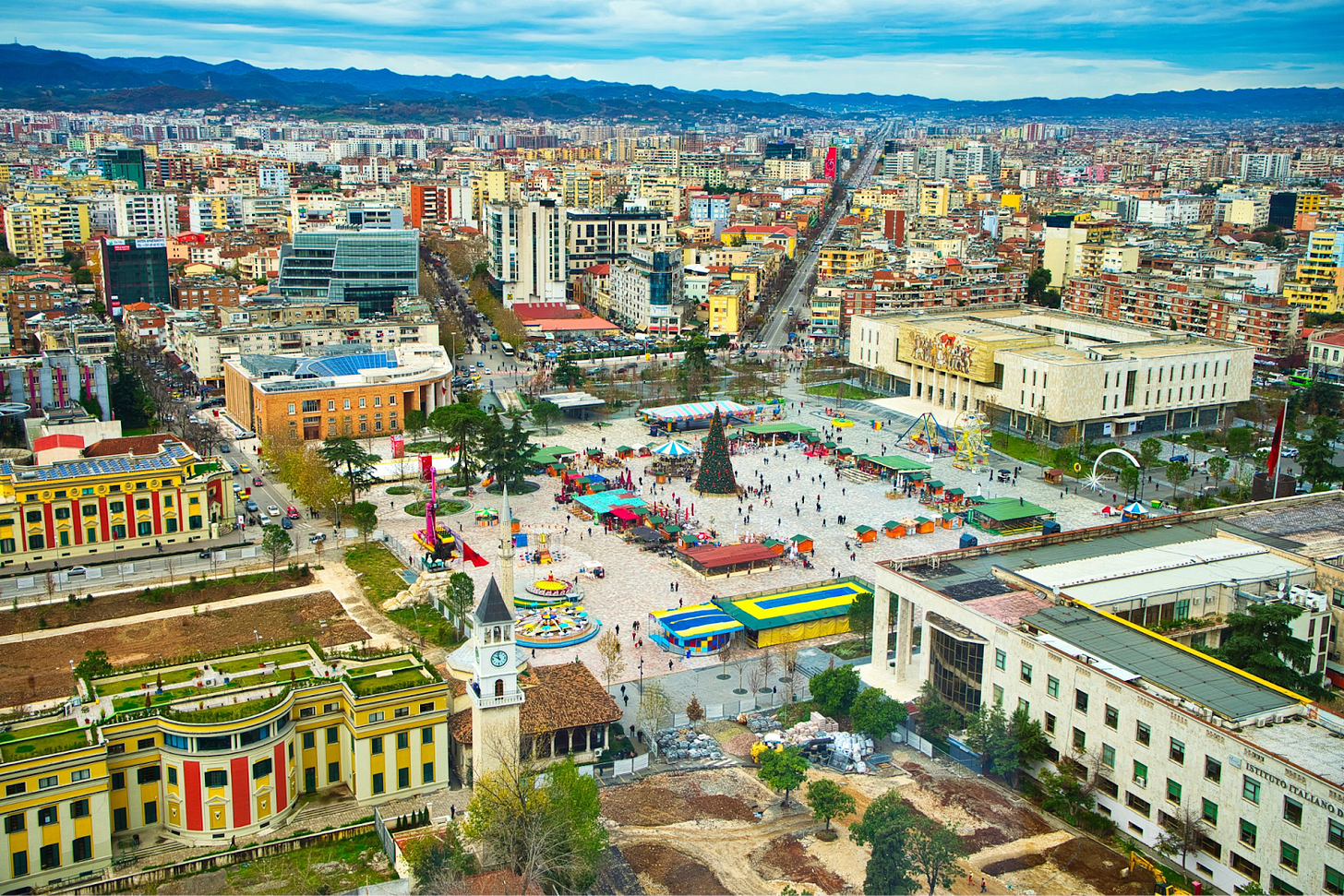
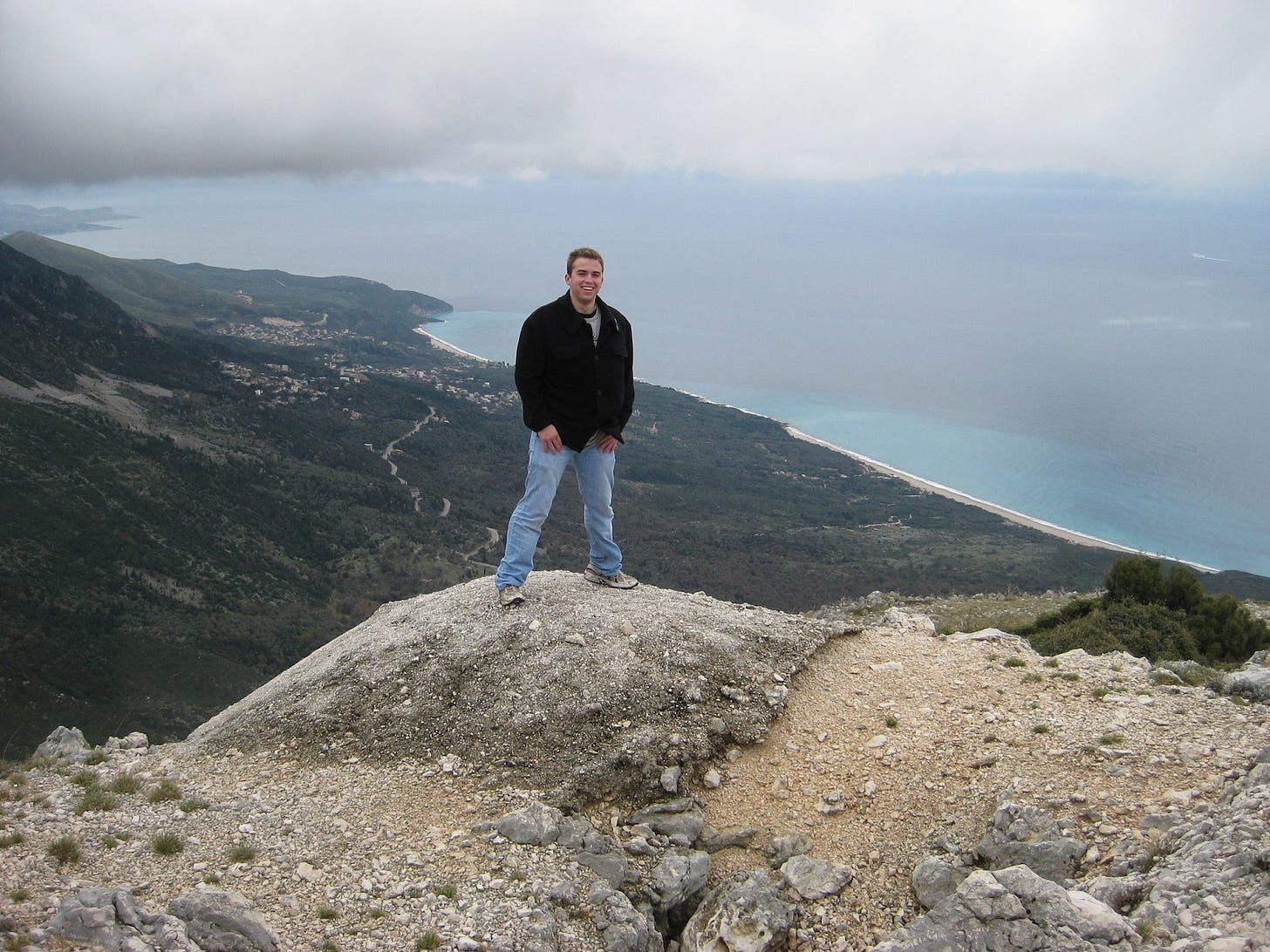

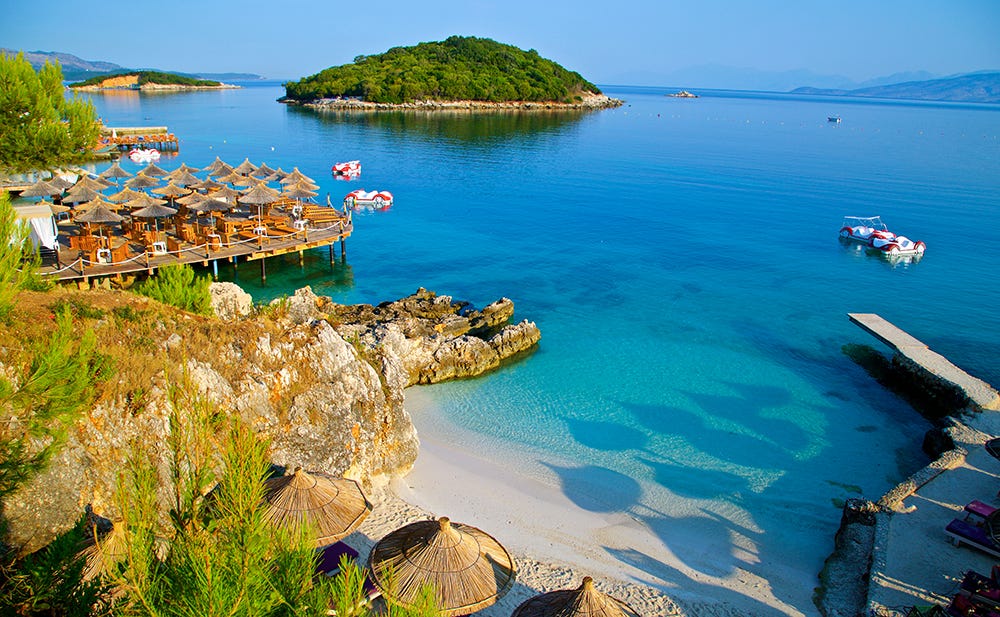
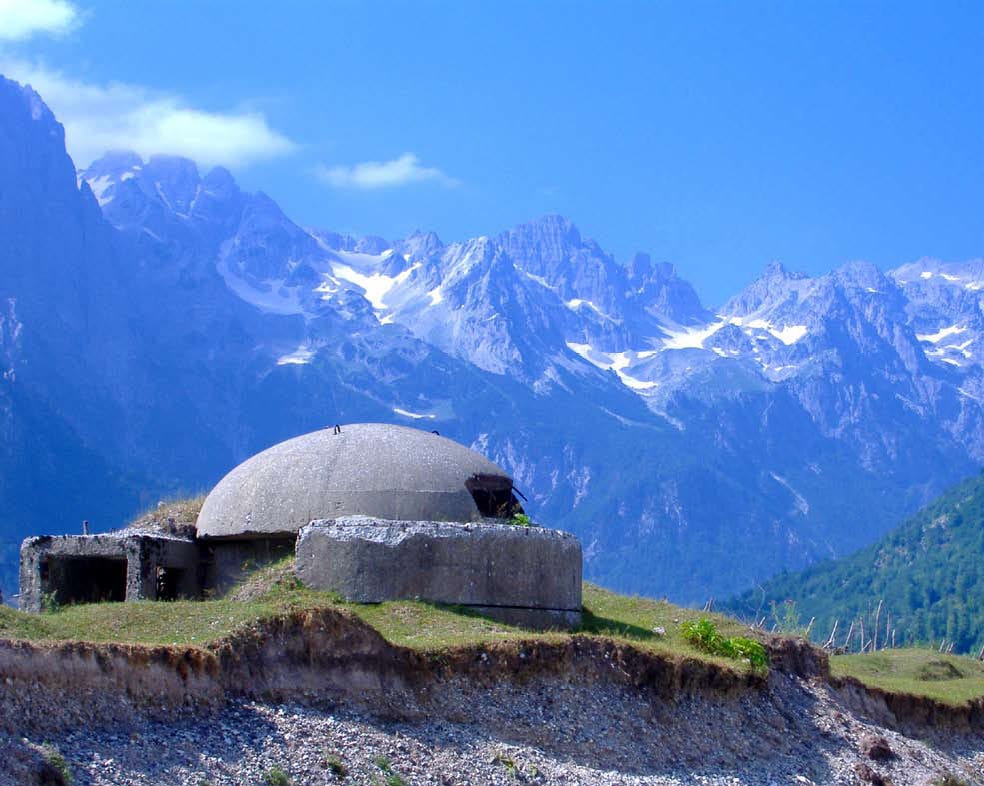

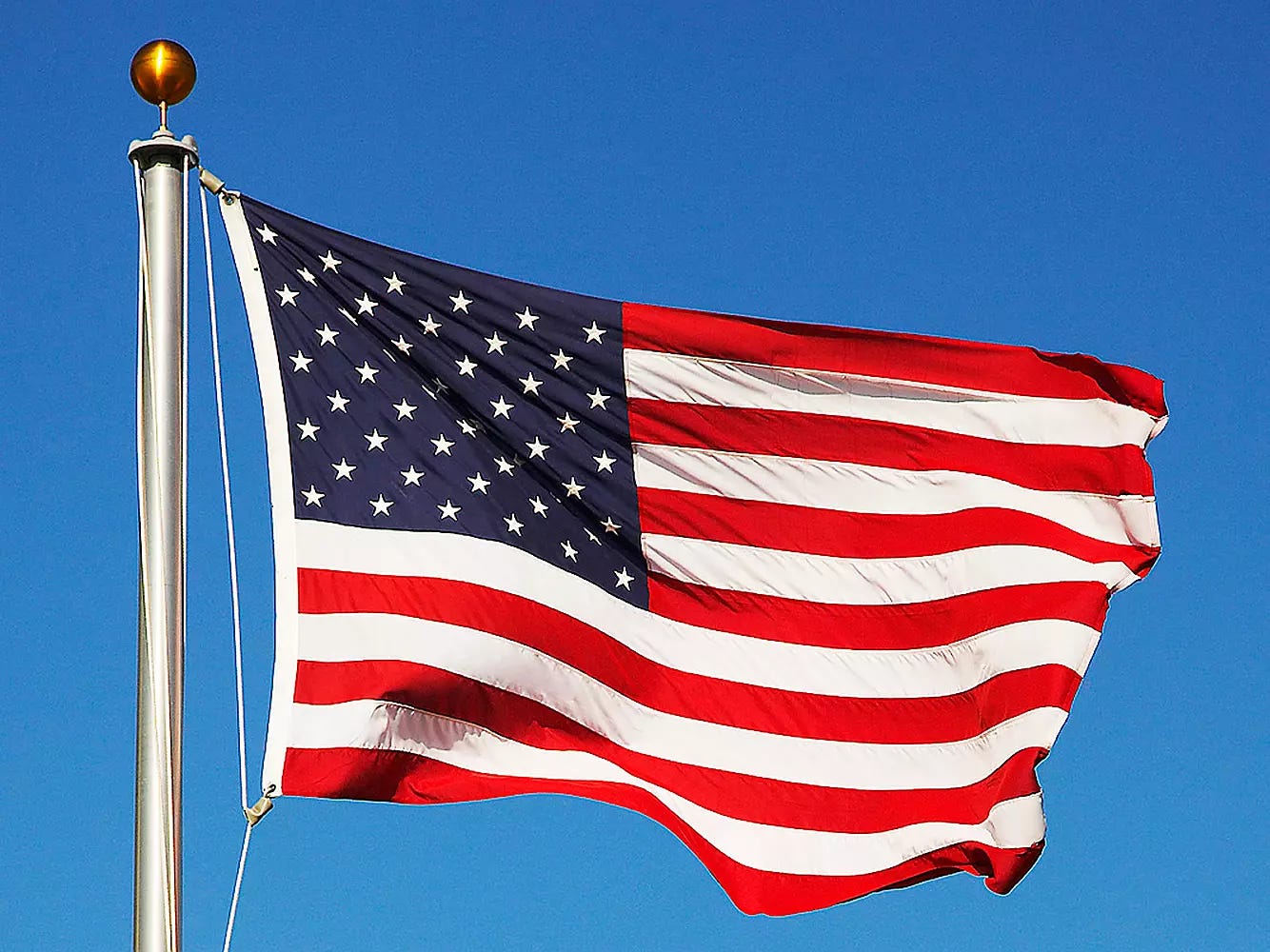
Mr. Hagen, three cheers for the Red, White and Dodger Blue!
You are on to something in that Walt Disney created Disneyland to promote just the kind of patriotism you suggest. A kind of fusion of the past and present to create a better future. America's past was not perfect but it was good. A closer look will reveal that the bad was done by individuals not devoted to American principles. I grew up in a neighborhood with many ethnicities mostly hispanic. I do not remember one of us badmouthing America.
Fun fact: during the My Lie massacre in Viet Nam Lt. Calley was stopped by an American chopper pilot who landed between the Marines and the villagers. What is wrong with America can be fixed by what is right with America.
Big Birthdays in the Hagen house today. Yay. Publish a picture of the big bouncy you rented. Take care.
The sports fandom analogy is a good one. The USA doesn't need to be perfect for us to be patriotic. And I think patriotism can easily act as a catalyst to try and improve the country.